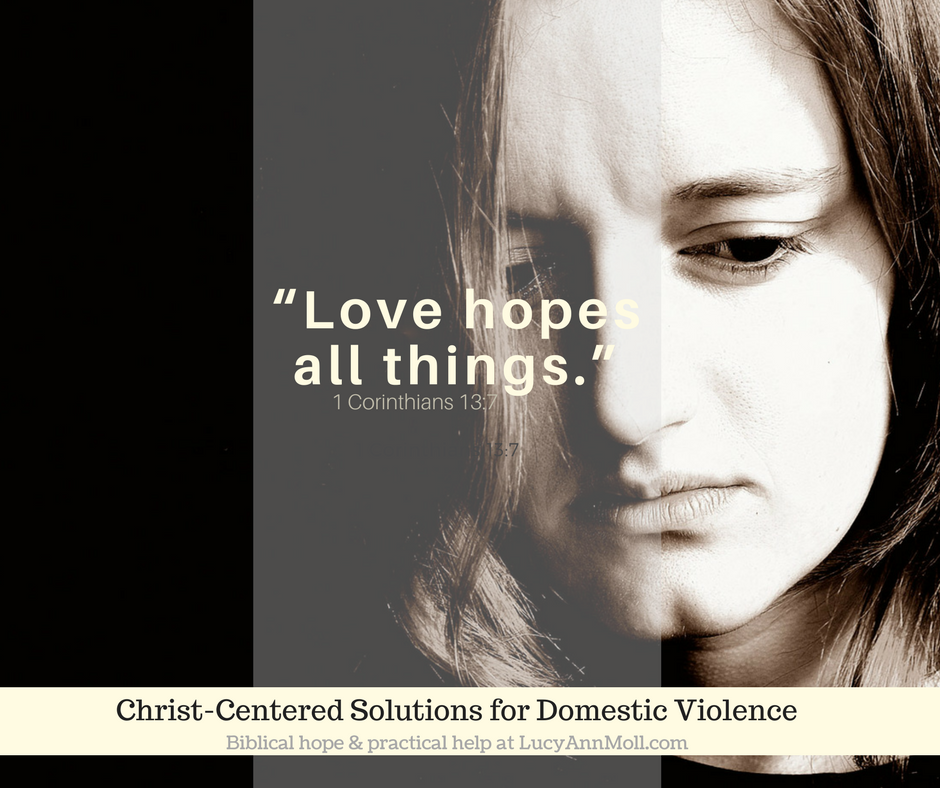by Lucy | May 30, 2017 | biblical counseling, emotions, relationships
 Abuse is patently wrong, but when should you leave the marriage or relationship? Keep reading to find out when — and if — you should leave. In part 3 of this four-part series on abuse, biblical counselor Jim Newheiser evaluates common statements made about abuse. His article appeared first here at the Biblical Counseling Coalition and is used with permission. Read part 1 and part 2.
Abuse is patently wrong, but when should you leave the marriage or relationship? Keep reading to find out when — and if — you should leave. In part 3 of this four-part series on abuse, biblical counselor Jim Newheiser evaluates common statements made about abuse. His article appeared first here at the Biblical Counseling Coalition and is used with permission. Read part 1 and part 2.

If You Feel You’re Being Mistreated, Should You Leave?
ASSERTION: If you feel that you are being mistreated or controlled, leave the relationship.
A valid concern: This statement is made because there are so many women who stay in dangerously abusive relationships when they have every right to seek safety and refuge.
Possible Harm of Believing the Assertion
The harm that can be caused: Those who are seeking to protect victims of abuse sometimes fail to distinguish between the degrees of sinful mistreatment that can take place in a marriage relationship.
The message some women get is that if your husband is to any extent controlling, manipulative, or angry, then you are in an abusive relationship and you need to get out. Women are told that an angry husband has broken the marriage covenant, and they have the right to divorce.
I affirm that a battered wife has every right to get away from a violent husband
Click & Tweet!
and that his failure to repent and to live at peace with her can eventually lead to the breakup of their marriage (1 Cor. 7:15). Sadly, however, I have seen women who are in difficult, but not violent marriages—in which there is often anger on both sides—who use the claim of abuse to divorce their husbands on less than biblical grounds.
The reality is that marriage brings together two sinners.
Click & Tweet!
Because of the fall, many marriages involve a struggle for control as described in Genesis 3:16. In many cases, both partners are guilty of sinful anger, which Jesus calls murderous (Matt. 5:21-22).
Wisely Investigating an Abuse Charge
It would be better to say: Wisdom needs to be exercised in distinguishing between degrees of sin in an allegedly abusive situation.
Just as the act of adultery is a greater threat to a marriage than a lustful look (Matt. 5:27-28), there is a difference between physical assault and a harsh word. Because Jesus declared, “What therefore God has joined together, let no man separate” (Matt. 19:6b), every effort should be made to preserve marriages and to help both men and women who have fallen short of perfectly keeping the marriage covenant to change.
Church leaders shouldn’t swing from the extreme of sending women back to abusive situations to the other extreme of encouraging the breakup of marriages which might be restored
Click & Tweet!
. A man who refuses to repent of controlling and angry behavior may be put through a process of church discipline. This process will often give the time and space needed for the abuser’s heart to be more clearly revealed.
(Friend, are you in a controlling, destructive, or difficult marriage? Why not get the help you need? Learn more about confidential, compassionate, effective biblical counseling by Skype or in person.
Contact me today.–Lucy)
Sharing Hope with Your Heart,


by Lucy | May 23, 2017 | biblical counseling, emotions
Pride is a heart-attitude sin that overflows into a person’s motivation, decision-making, and activities. Pride is at the root of nearly every problem we struggle with in counseling!
You are reading part one of a two-part series on the prideful heart by biblical counselor Julie Ganschow, listed in Heart2Heart Counselor Directory on my website and the founder and director of Reigning Grace Counseling Center in Kansas City, MO. Her article is reprinted with permission.

The heart of pride is focused on “self.” Prideful people believe they deserve better than what life has brought them. They become sorrowful, resentful, and even jealous of other people and their successes. Pride breeds self pity, which is a major component in depression. Typically, people who struggle with pride will live life based on how they feel and expect everyone else to accommodate them and adapt to their moods.
Two key characteristics of pride are independence and rebellion. It should not be too difficult for us to understand why this is so. The truth is we all want our own way about things, and we usually will do almost anything to have it our way. The sinful nature leads us to desire independence, and we rebel at the thought of being under anyone’s control or authority.
In his pride the wicked does not seek him; in all his thoughts there is no room for God. Psalm 10:4 (NIV)
In our hearts we say as Pharaoh did, “Who is the Lord that I should obey Him?” Exodus 5:2
God Hates Pride
All who fear the LORD will hate evil. That is why I hate pride, arrogance, corruption, and perverted speech. Proverbs 8:13 (NLT)
The heart of pride brings devastating consequences that God ordains: a hardened heart and consequences of this sin.
Scripture shows us the results of pride through the examples of two kings: King Nebuchadnezzar and King Herod. They both became prideful and consequently were humbled by God.
But when [Nebuchadnezzar’s] heart became arrogant and hardened with pride, he was deposed from his royal throne and stripped of his glory. He was driven away from people and given the mind of an animal; he lived with the wild donkeys and ate grass like cattle; and his body was drenched with the dew of heaven, until he acknowledged that the Most High God is sovereign over the kingdoms of men and sets over them anyone he wishes. Daniel 5:20-21 (NIV)
King Nebuchadnezzar lived like an animal until he came to his senses and repented of his sin. God then restored the kingdom to him.
On the appointed day Herod, wearing his royal robes, sat on his throne and delivered a public address to the people. They shouted, “This is the voice of a god, not of a man.” Immediately, because Herod did not give praise to God, an angel of the Lord struck him down, and he was eaten by worms and died. Acts 12:2-23 (NIV)
Pride Hardens the Heart
In your life, pride will cause your heart to harden toward God. Consequently, God will not allow you to prosper. He will bring you dishonor, which is the last thing a prideful person wants.
When pride comes, then comes disgrace, but with humility comes wisdom.Proverbs 11:2 (NIV)
Pride brings opposition from God. He will not share His glory with anyone or anything.
All of you, clothe yourselves with humility toward one another, because, “God opposes the proud but gives grace to the humble.” 1 Peter 5:5 (NIV)
The prideful person is self-deceived.
For if anyone thinks himself to be something, when he is nothing, he deceives himself.” Galatians 6:3 (NKJV)
Pride and ‘Low Self-Esteem’
Often prideful people are mistakenly diagnosed with “low self-esteem” because their actions and attitudes appear to be self-depreciating. Low self-esteem is defined as “a person’s belief regarding the degree to which he is worthy of praise.”
The prideful person already thinks very highly of himself or herself! People infected by pride typically think so much of themselves that they believe the world should revolve around them.
The only thing important to prideful people is getting their needs filled. It may be an emotional need, a desire for attention, or a resistance to conform to social norms in order to be seen as an individual. Prideful people struggle with bitterness, revenge, conceit, self pity, a competitive nature, gossip, slander, and vanity. They display a desire to be noticed, which is disguised as shyness. They typically have a lust for attention, approval, and praise. Those who attempt to build them up psychologically only assist them in further self-indulgence.
(Watch for part 2 in this series on pride. Be sure you get it when you subscribe to my blog. Thanks!–LAM)
Sharing Hope with Your Heart,


by Lucy | Nov 17, 2016 | biblical counseling, relationships
People who want help need. . . change: heart change for life change. The strangely good news is the problem is clear: sin. What’s less clear to some folks is how biblcial change works. Biblical counselor Julie Ganschow — listed on Heart2Heart Counselor Directory here — lays out this compassionate and effective change process. This article apppeared first here on Julie’s website and is used with permission. Most people who come for help are looking for change. In relationship counseling, the individuals are usually looking for the other person to change. Those in individual counseling are often looking for their circumstances or feelings to change, and they don’t know how to make that happen.
Most people who come for help are looking for change. In relationship counseling, the individuals are usually looking for the other person to change. Those in individual counseling are often looking for their circumstances or feelings to change, and they don’t know how to make that happen.
In 1 Corinthians 6:9 and Galatians 5:19-21, we find a few ugly lists of issues that are typical as presenting problems in a biblical counseling relationship. (These ,of course, are not the only two places in the Bible we find sinful habits listed).
While you may want to believe that your particular sin is new or unique, the Bible does cover all of the heart level sins known to man. How each of us acts out our sin varies, but honestly, there is no new sin under the sun.
This is excellent news for us sinners! The problem you bring to the table can be totally different, yet the cause of sin is identical.
Battling Besetting Sins
Every one of us can become habituated to one or more kinds of sin. Another way of thinking about habitual sin might be found in an older term, besetting sin.
Our sinful habits are developed when we do something so frequently that it becomes an automatic, comfortable pattern of living.
Click & Tweet!
It becomes an automatic behavior, such as the woman who habitually overeats chocolate when she is feeling sad or lonely. She may be told by well-meaning people that she has a disease such as Compulsive Overeating. She might be prescribed an anti-depressant and told to attend a self-help group. These responses remove responsibility from her for her actions and steal her hope.
However, identifying these behaviors biblically can give her tremendous hope when she learns that her eating too much or the wrong kinds of food have become habits that can be unlearned. Taking medication will not help a person put off a sinful habit. By employing the process of biblical change, with practice she will change and restructure her life in a manner that glorifies God.
It is important to realize that such habits did not develop overnight, and new habits will not become automatic overnight. Biblical change takes time and practice. It takes time for someone who is habituated to a particular sin to transform and begin consistently to demonstrate new attitudes and actions.
Biblical Process of Change
The key to real and lasting change is found in the biblical process of putting off and putting on found in Ephesians 4:24-26. As you read through the Bible, you will find a number of verses that inform us in one way or another about disciplining ourselves for the purpose of godliness (1 Timothy 4:7, Colossians 4:7, 1 Timothy 6:11).
Part of the process I would recommend is found in 2 Timothy 3:16 which instructs us to teach, rebuke, correct, and train in righteousness.
All Scripture is God-breathed and is useful for teaching, rebuking, correcting and training in righteousness. 2 Timothy 3:16
We all need to know more about God and how to bring Him glory by how we live our lives, right? Sit under sound biblical teaching. We must be willing to accept a reproof or a rebuke for our ungodly behavior and attitudes, and then correct them by putting on biblical behavior, and finally, to be trained in the specific righteous behavior we must put on.
The idea of training means to practice it over and over, very much like a gymnast practices the same routine to the point that the moves she makes on the balance beam or the floor are identical time after time. Rather than learning physical moves, we replace the thoughts, beliefs, and desires of our heart that we are currently practicing (Galatians 5:19-20), with those that honor and glorify God (Ephesians 4 and 5, Philippians 2, and Colossians 3).
Biblical Change vs Behaviorism
 There are a number of verses in the Scriptures that talk about re-habituation. Hebrews 5:13 and 10:25 are among them. Our goal is not merely change in our behavior, putting off and putting on; we must realize and understand the importance the heart plays in putting off those old behaviors and putting on righteous ones.
There are a number of verses in the Scriptures that talk about re-habituation. Hebrews 5:13 and 10:25 are among them. Our goal is not merely change in our behavior, putting off and putting on; we must realize and understand the importance the heart plays in putting off those old behaviors and putting on righteous ones.
Because our behavior comes from our immaterial part, or what the Bible calls the heart, the changes to put off and put on must originate there. The sinful thoughts, beliefs, and desires that bring us into counseling originate in the heart. As the heart is submitting to God’s authority, and the mind is being renewed by the Word of God, new behavior patterns will form. To leave out the critical component of heart change for life change makes the biblical counselor a mere behaviorist, and this type of counsel is certain to fail.
Ephesians 4:24-26 can be misused to become rote behaviorism. This is a danger with some counselors in how they instruct their counselees.
The critical component in this passage is the renewal of the mind. The mind is equal to the heart and must be biblically informed (Romans 12:2) about how to change.
This is why reading and meditating on the Word of God is so critical to this process of biblical change. We must know what the Word of God says about the attitudes and sins of the heart. The new response (putting on) ideally will flow from a heart that now sees our sin as grievous to God.
An Offer for You
Are you looking for change? Do you want to know how to apply God’s timeless truth to your heart and experience life change? May I invite you to leave a comment. If you prefer contact me directly, and we can choose a time for a 15-minute phone consultation for you to ask questions or request prayer. God loves you lavishly, friend. He heals the brokenhearted. –LAM
COUNSELING: Learn more about compassionate biblical counseling by Skype.
FREE eBOOK: Click here to dowload a free counseling resource. Easy, fast.
Sharing Hope with Your Heart,

by Lucy | Nov 10, 2016 | biblical counseling, emotions |

Your language matters! The words you say indicate what’s going on in your heart. And when you replace your words with biblical language, you can make significant progress. Observe how Heart2Heart Counselor Suzanne Holland listens to her counselee’s language and helps her find victory. Suzanne’s article appeared first here and is used with permission.

A counselee I was seeing for depression and anger issues once had this response when I asked her how her week went:
I really messed up this time. I yelled at my kids, and they didn’t even deserve it! I was so irritated with their behavior that I just snapped and started screaming.
I realized almost as soon as the first sentence came out of my mouth that I was blowing it, but I couldn’t stop. I was just so mad.
She continued to describe the incident, sharing with me about what happened when her husband came home:
Well, I had told the kids I was sorry, but I felt really bad about my slip-up. When my husband got home, I was irritable and snappy with him, because I was just so mad at myself. I had to apologize to him too, but that didn’t help either.
I went to bed depressed and cried myself to sleep. Sometimes I think I’ll never get this temper under control!
The Language of Truth
As I listened to my counselee, I was making notes about the words she had chosen to describe her actions.
Many times, the language our counselees use to describe their problems can give us a clue as to why they are not finding victory. I’ll explain what I mean by sharing with you the questions I asked my counselee about her word choices, using the quotes above as an example.
I really messed up this time.
Questions: What does that mean? What is the biblical word for “messed up”?
Did my counselee make a mistake when she yelled at her kids? If I “mess up,” that might mean I forgot to carry a number in my checkbook, or I bumped the curb when I turned the corner.
Yelling and screaming at your kids is not messing up. Yelling and screaming at your kids (or anyone else) is an uncontrolled outburst of wrath, and it is sin.
I was so irritated with their behavior that I just snapped and started screaming.
Questions: What kind of behavior were you expecting? What entitles you to have what you expect? What is the reason that the behavior was not brought under discipline before it got to that point? Was everything calm and cool before you “just snapped,” or were there warning signs that you were becoming angry, which you chose to ignore?
Language Reveals a Deeper Problem
When someone tells me they are irritated with something, it’s a sure sign that they believed they were entitled to something else.
Any sense of entitlement is an attitude of pride. Also, at least in parenting, behavior that reaches the point where Mom wants to scream is usually a behavior that should have been addressed much sooner. This is often the result of distraction or just plain laziness on mom’s part.
With very rare exceptions, no one “just snaps.” There are always thoughts and warning signs leading up to a sinful outburst of anger. Mom may choose to ignore or stuff them, but they are there, and it is a decision she makes to either address or ignore them.
I realized almost as soon as the first sentence came out of my mouth that I was blowing it, but I couldn’t stop. I was just so mad.
Question: Was there an unseen force that took over your body and made you keep yelling and screaming?
This may  sound facetious, but it gets the point across quickly. Obviously, this part of her report is a lie, whether or not she sees it. Of course, she had a choice to stop screaming, even in the midst of her angry outburst. Her decision to continue led to her sin.
sound facetious, but it gets the point across quickly. Obviously, this part of her report is a lie, whether or not she sees it. Of course, she had a choice to stop screaming, even in the midst of her angry outburst. Her decision to continue led to her sin.
Well, I had told the kids I was sorry, but I felt really bad about my slip-up.
Why Apologize?
Questions: How does the Bible teach us to express sorrow when we have hurt someone? Where in the Bible do people say they are sorry? What is the biblical word for ‘slip-up’?
Apologizing for a slip-up is not the path to reconciliation. Asking for forgiveness for sin is.
Click & Tweet!
My counselee “felt really bad” because she had not repented and received forgiveness from God and her children for her sin.
When my husband got home, I was irritable and snappy with him, because I was just so mad at myself. I had to apologize to him too, but that didn’t help either.
Questions: What do you think is the reason your apologies didn’t help your mood?
This is where we will begin to discuss the difference between messing up and sinning, between apologizing and repenting. She went to bed depressed (sorrowful without hope), and rightly so! There is no hope in apologizing for a mess-up. There is, however, great hope in repenting of sin and receiving forgiveness!
Changing Your Language–Wow!
The point of dissecting these few sentences is to show you the importance of using biblical language when you address counseling issues. Most counselees aren’t even aware that the language they use to describe their sin makes a difference in whether or not they will overcome it.
Let’s rephrase my imaginary counselee’s report, to see if it makes a different impact:
I really sinned this time. I yelled at my kids, and they didn’t even deserve it! I was so entitled and prideful about their behavior that I just ignored the warning signs that I was becoming sinfully angry, and made a decision to start screaming.
I realized almost as soon as the first sentence came out of my mouth that I was grieving the Lord, but I held fast to my decision and exercised my will to continue. I was just so sinfully angry!
And about her interaction with her husband…
Well, I had told the kids I was sorry, but I felt extreme guilt about my sin. When my husband got home, I was prideful and sinfully angry with him, because I had not received forgiveness for my sin. I had to apologize to him too, but that didn’t help either.
I went to bed sorrowing without hope, and indulged in self-pity. Sometimes, I think I’ll never get this sinful anger under control!
Biblical Language Pierces the Heart
Do you see how using biblical language shines a very bright light on sin, and makes it crystal clear what needs to happen to bring about change? My counselee certainly did!
As she learned to use biblical language to describe her temptations and sins, her heart was more readily pierced, and she began to hate even the idea of knowingly sinning in these ways. One thing she said in this quote was probably true: Thinking and speaking the way she was about it, she likely would never have overcome it.
There is no hope in “feeling guilty.”
When we have sinned, the only way to freedom is repentance.
Click & Tweet!
If I don’t know or acknowledge that what I have done is sin, how can I be forgiven? How can I be restored to a right relationship with the person against whom I have sinned?
I will continue to sin, apologize, and feel bad forever if I don’t understand and apply the truth of Scripture to my behavior.
Are there areas of your life, or perhaps your counselees’, where you think using more consistently biblical language could help in overcoming a pattern of sinful response?
Reply in the comments, and let’s talk about it!
An Offer from Lucy
Are you struggling? I invite you to sign up for a 15-minute phone consultation — it’s free — to ask questions and discover if biblical counseling is right for you. (We can Skype no matter where you live or meet in person in greater Chicago.) Contact me.
Would you like more hope-filed and practical encouragement? Sign up for my blog and get a free eBook.
Sharing Hope with Your Heart,

by Lucy | Oct 11, 2016 | biblical counseling

Do you love your sin? Or are you sick of it? In this soul-baring article by counselor Suzanne Holland, she shares how to uproot the sin you love and hate. Suzanne’s article appeared first here and is used with permission. She is among the women listed in Heart2Heart Counselor Directory.

Some people really love their sin. Are you one of them?
If someone were to ask me this question, I would immediately respond with an emphatic “No! I love the Lord,” and I struggle against sinful attitudes and actions every day. My flesh is relentless in its desire to be satisfied, but I am battling it daily, with some success. I’m sure that I don’t love my sin!
But wait.
If I don’t love my sin, then why does it seem I’m unable to uproot it from my heart? I’m not talking here about the sin nature, or the flesh or the influence of the enemy. I’m talking about what we Christians call besetting sins.
What Is a Besetting Sin?
These are the sins that seem to be constantly tempting us. Like the child’s game of Whack-a-Mole, we think we’ve got it beaten, and it pops up somewhere else. It seems we are in a constant, life-long cycle of sin-consequence-repentance-forgiveness. This is very discouraging, and we wonder if we will ever overcome this sin.
These besetting sins seem more deeply rooted than others. If you think about it, you can probably remember other sins that used to be problematic for you in your early Christian days, but no longer seem to be much of an issue.
For example, I used to have a significant anger problem. I was very impatient and easily annoyed, which would quickly turn to anger and frustration. I had to confess and repent many times, but eventually I seemed to get a handle on that, and it doesn’t control me anymore.
But another sin habit really seems to have a death grip on my heart.
My awareness of this particular issue has been keenly sharpened over the last few years as I have struggled with chronic pain and disability. That issue is self-pity.
I am always amazed at how easily I can fall into this mode of feeling sorry for myself because I can’t do the things I want to do. I was watching an old Willy Wonka movie yesterday, and I saw myself in the character of Veruca Salt, who was terribly spoiled and petulant. As I watched her demand that her father buy her everything she wanted, I became convicted of my own discontentment.
How to Handle a Besetting Sin
But for me, it’s more than just discontentment. When I can’t have what I want, and my Father won’t get it for me, I begin to feel sorry for myself.
As I watch others who seem to have a better life than I do, I become jealous, and this compounds my misery. I become a spoiled brat who believes she is entitled to whatever she wants, just because she wants it! This is not acceptable for a child of the living God! But how can I change?
Oh, what a miserable person I am! Who will free me from this life that is dominated by sin and death? Thank God! The answer is in Jesus Christ our Lord (Romans 7:24).
Thank God indeed, I already have the answer to my problem! I have been freed from this sin. Now, I must receive the pardon and break free of the bonds of besetting sin.
I owe Him my life, my every breath, my very soul! How can I possibly feel sorry for myself when I have eternal life? This time here on earth, in this broken body, is a vapor (James 4:14). Besides that, there are many who are living in much greater difficulty than I am. Some of them would probably give anything to have what I have.
Opening Your Eyes to the Truth
The key to uprooting this sin in my life is to open my eyes to these truths, and to the people all around me who are suffering. Ministering to others is the absolute best cure for self-pity. I have experienced this many times as I am working on this sin pattern in my own life. As I reach out to help others, my own problems are diminished, I am more grateful, and I begin to move toward that contentment that seems so elusive.
Veruca’s father repeated something to her over and over as she sang about all her demands. He said, “You can have all that when you get home.” This is the refrain I must keep in mind, to combat these feelings of self-pity, jealousy and discouragement. All these things I desire and cry out to God for, will be mine when I get Home to Him.
There will be no pain, no sorrow, and no limits on what I can do. But I must be patient. My contentment rests in trusting God to enable me to do all He has called me to do here, nothing more and nothing less. I can be satisfied in knowing that He will bring me to perfection in Him on that day when I arrive at Home.
If you haven’t seen the Willy Wonka movie, and you’d like to meet Veruka, click here. You may see a little bit of yourself in her, too!

Friends, did you learn from Suzanne’s article on uprooting sin? She is among the biblical counselors on the Heart2Heart Counseling Directory. Visit her directory page here. Consider making an appointment with her.
Sharing Hope with Your Heart,

 Abuse is patently wrong, but when should you leave the marriage or relationship? Keep reading to find out when — and if — you should leave. In part 3 of this four-part series on abuse, biblical counselor Jim Newheiser evaluates common statements made about abuse. His article appeared first here at the Biblical Counseling Coalition and is used with permission. Read part 1 and part 2.
Abuse is patently wrong, but when should you leave the marriage or relationship? Keep reading to find out when — and if — you should leave. In part 3 of this four-part series on abuse, biblical counselor Jim Newheiser evaluates common statements made about abuse. His article appeared first here at the Biblical Counseling Coalition and is used with permission. Read part 1 and part 2.





 Most people who come for help are looking for change. In relationship counseling, the individuals are usually looking for the other person to change. Those in individual counseling are often looking for their circumstances or feelings to change, and they don’t know how to make that happen.
Most people who come for help are looking for change. In relationship counseling, the individuals are usually looking for the other person to change. Those in individual counseling are often looking for their circumstances or feelings to change, and they don’t know how to make that happen. There are a number of verses in the Scriptures that talk about re-habituation. Hebrews 5:13 and 10:25 are among them. Our goal is not merely change in our behavior, putting off and putting on; we must realize and understand the importance the heart plays in putting off those old behaviors and putting on righteous ones.
There are a number of verses in the Scriptures that talk about re-habituation. Hebrews 5:13 and 10:25 are among them. Our goal is not merely change in our behavior, putting off and putting on; we must realize and understand the importance the heart plays in putting off those old behaviors and putting on righteous ones.

 sound facetious, but it gets the point across quickly. Obviously, this part of her report is a lie, whether or not she sees it. Of course, she had a choice to stop screaming, even in the midst of her angry outburst. Her decision to continue led to her sin.
sound facetious, but it gets the point across quickly. Obviously, this part of her report is a lie, whether or not she sees it. Of course, she had a choice to stop screaming, even in the midst of her angry outburst. Her decision to continue led to her sin.


